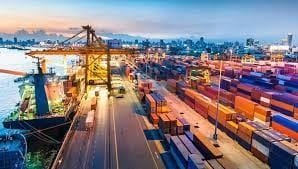Last Updated on May 24, 2025 by Rida Gul
Cisco and Adani Group in Gujarat, set forth initiatives in a big digitization push to transform the Indian Maritime sector
Embracing technological developments to turnaround the Indian Shipping Industry has become imperative, considering the enormity and the linked potential of this sector. The government alongside other investors like Cisco and Gujarat-based Adani group have taken up the agenda to digitize seaports and inland waterways in India.
Digitalization of ports will not only bring down the operational costs but also smoothen and simplify operations of major ports and convert them into ‘smart ports’ or ‘intelligent ports’ in tune with the Maritime India Vision- 2030.
The technology conglomerate Cisco entered a partnership with some of the India’s major ports and inland waterways including IWAI (Inland Waterways Authority of India), Kolkata, Deendayal and Vishakhapatnam Port to digitally transform them.
At present, Cisco has undertaken 14 projects across seven Indian ports. Three projects have been completed and the remaining 11 are in different stages of development. This partnership is in accord with India’s Maritime Vision 2030, with the focus on accelerating the performance and productivity of the country’s maritime sector over the period of next decade.
The digital revolution of Indian waterways and ports will strengthen India’s vigor to transition into a worldwide manufacturing powerhouse.
The initiative to digitalize waterways and ports by Cisco is consolidated of 4 focus areas. Firstly, to minimize the turnaround time which directly affects the revenue and capacity. Monitoring equipment in real-time to prevent revenue loss and equipment failure is another area of focus. The company is also set to implement energy management and analytics to improve efficiency. Through a multi-channel communication and collaborative platform Cisco is working on enhancing employee safety and communication as well.
A similar approach was adopted by Gujarat-based Adani group last year, when the CIO of Adani Ports, gave the nod for the world’s first large scale TOS implementation at Mundra Port, owned by the company.
Adani Ports and Special Economic Zone Limited (APSEZ) is a flagship of Adani Enterprises headquartered in Gujarat. APSEZ accounts for approximately one fourth of the cargo mobility in India and is one of the largest commercial port’s operators of the nation.
The company carried forward its business as usual even when the shipping industry was hit hard by the pandemic, across the globe. APSEZ continued to facilitate global trade by enabling its entire workforce to engage in business from home, operating the ports and terminals with reduced manpower.
Adani Ports in Gujarat, deployed TCS’s digital solution to its Mundra port last year. Tata Consultancy Services (TCS), information technology services firm administered its DynaPORT solution at Adani’s Mundra shipping terminal.
TCS, in a statement, stated that the shipping terminal operating system deployed at the Mundra port owned by Adani Group in Gujarat, administered remotely from the company’s Secure Borderless Workspaces platform based in Mumbai, will help the terminal automate and optimize operations.
APSEZ with DynaPORT, expects to enhance terminal performance, establish resource optimization, minimize total cost of ownership, and expedite business transformation. More so terminal operators roll out applications faster virtually with the deployed solution.
Last year in May, Adani Ports and Special Economic Zone Limited entered a partnership with TradeLens, a block chain-based platform which facilitates supply chain solutions.
APSEZ aimed at integrating these TradeLens’ block chain solutions at some ten courier management facilities across six ports in India. The ports owned by Adani Group – four in Gujarat and others in Goa, Odisha, Kerala, Tamil Nadu and Andhra Pradesh were deployed with these solutions.
Both major and non-major ports in India have deployed advanced technological innovations like block chain, artificial intelligence and the Internet of Things (IoT), in order to digitally transform these shipyards. Apart from minimizing waiting time, functioning of ports will increase with the introduction to sensor systems and IoT enabling real-time tracking of containers.
The Prime Minister of India, Mr. Narendra Modi unveiled the Maritime India Vision (MIV) 2030 in March this year, which is a ten-year blueprint with the goal to refurbish the Indian maritime industry.
As per the document by Ministry of Ports, Shipping and Waterway, “Maritime India Vision 2030 would involve an investment of over ₹3 lakh crore, which would generate more than 20 lakh jobs and unlock annual revenue potential for major ports worth over ₹20,000 crore,”
Government initiatives under MIV 2030, including Enterprise Business System (EBS) to improve Ease of Doing Business, are undertaken to digitalize and simplify processes across Major Ports by 2021. The development of National Marine Logistics Portal, in an attempt to administer unified shipping e-registration portal and to implement 100 % paperless process including online payments, is another such initiative.
Seaports play a key role in any nation’s economy and are considered the gateways for global trade. With the underlying mantra of ‘ports for prosperity’, notable initiatives and measures have been undertaken for the betterment of the sector, under the aegis of Indian government and by leading conglomerates like Adani Group in Gujarat and Cisco.
click here for more interesting articles



























